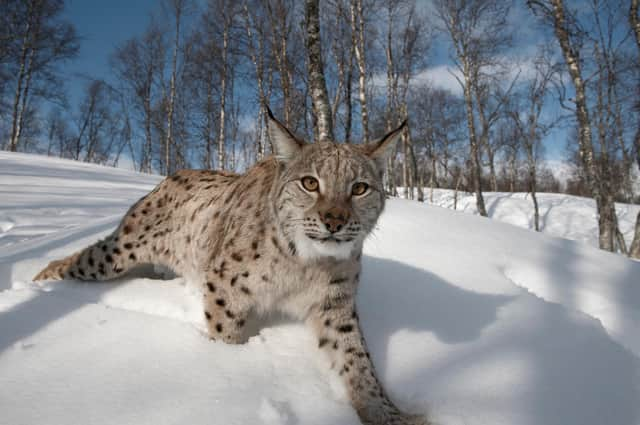Should Scotland once again have big cats roaming wild in Highland forests?


This is the question being asked as a new consultation is launched to get feedback on the potential reintroduction of wild lynx to Scotland.
The species was once native to the UK but became extinct around 1,300 years ago.
Advertisement
Hide AdAdvertisement
Hide AdThese large cats are Europe's third-largest predator, after bears and wolves, and will normally feed on deer, mountain hares and other small mammals.
Now a new partnership made up of the environmental charities Scotland: The Big Picture, Trees for Life and Vincent Wildlife Trust is investigating bringing the felines back to Scotland.
Ecological research has shown that extensive areas of Scotland are suitable to support lynx, but the charities say returning the animals to the wild is less about science and more about people’s willingness to live alongside a species that has become forgotten on these shores.
The year-long consultation, Lynx to Scotland, aims to impartially and accurately assess public and stakeholder attitudes towards the idea - particularly in rural communities.
Peter Cairns, executive director of rewilding group Scotland: The Big Picture, said “With a global biodiversity crisis we have a responsibility to have open and constructive conversations around restoring key native species to the Scottish landscape – and science shows that apex predators like lynx play a vital ecological role in maintaining healthy living systems.”
Lynx are now spreading in range and numbers across mainland Europe as hunting laws are tightened and public attitudes to large predators soften.
Several reintroductions since the 1970s have brought ecological and environmental benefits to countries more densely populated than Scotland, icluding areas used for farming, hunting, forestry and tourism.
YOU MIGHT ALSO LIKE: Scottish wildcats to be reintroduced in the Highlands to stave off extinction
Lynx are solitary woodland hunters that are rarely glimpsed, with attacks on humans virtually unknown.
Advertisement
Hide AdAdvertisement
Hide AdResearch suggests there is sufficient habitat and prey – particularly roe deer – in the Highlands to support around 400 of the cats.
Steve Micklewright, chief executive of Trees for Life, said: “Scotland has more woodland deer than any other European country, and their relentless browsing often prevents the expansion and healthy regeneration of our natural woodlands.
“By preying on roe deer, lynx would restore ecological processes that have been missing for centuries and provide a free and efficient deer-management service.”
Jenny MacPherson, science and research programme manager at the Vincent Wildlife Trust, which will lead the study, said: “Reintroducing lynx would inevitably bring challenges.
“Lynx to Scotland will actively include stakeholders representing the full range of perspectives in order to produce meaningful conclusions about the level of support or tolerance for lynx, and therefore the likely success of any future reintroduction.”
A bid to release lynx in the Kielder Forest in Northumberland, spearheaded by rewilding campaign group Lynx UK Trust, was turned down by Westminster in 2018.
The then UK environment secretary Michael Gove said government advisers had “particular concerns in a number of areas” – including “organisational resilience”, funding and reliance on volunteers.
Lynx to Scotland runs from January 2021 to February 2022 and is not associated with any other previous or current initiatives to restore lynx to Britain.
